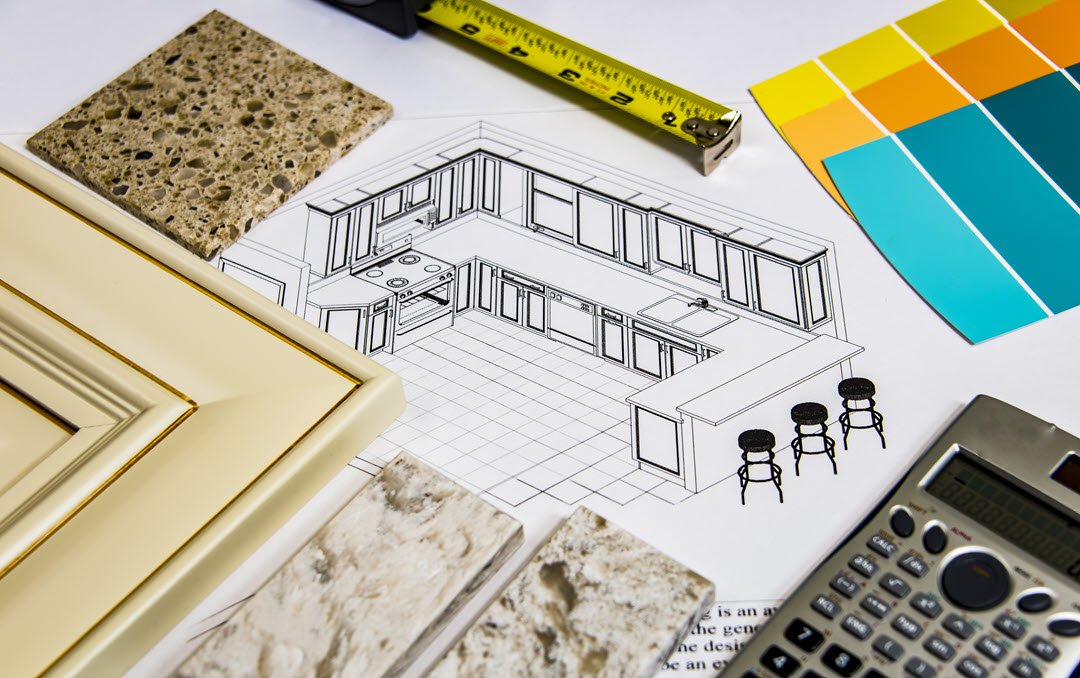Transform the heart of your home into your dream space with the perfect kitchen countertops.

There is an overwhelming range of materials, textures, and kitchen countertops styles. How do you choose to match aesthetics with functionality? It’s time to eliminate the confusion and find the solution best suited to your lifestyle and personal preferences.
Through this summary article on kitchen countertop options, you’ll journey from the timeless elegance of granite to the robust charm of concrete, fully equipped to make an informed choice. Whether you’re renovating or constructing a new kitchen, allow us to eliminate the guesswork and bring your culinary vision to life.
Get ready to revitalize your space and ignite a refreshing change because the kitchen of your dreams is just one countertop away!
Moreover, you may also want to review the article on the Delmarva Design Center blog (referenced below) for more information on selecting the perfect kitchen countertop for you.
Reference: Choosing the Perfect Countertop
Table of Contents
SECTION 1: The Importance of Choosing the Right Kitchen Countertop
SECTION 2: Different Types of Kitchen Countertops
SECTION 3: Factors to Consider When Choosing Kitchen Countertops
SECTION 4: Comparing Popular Kitchen Countertop Materials
SECTION 5: How to Maintain Different Types of Kitchen Countertops
SECTION 6: Mistakes to Avoid When Choosing a Kitchen Countertop
SECTION 7: Expert Tips for Choosing the Perfect Kitchen Countertop
Countertop Selection Conclusion
SECTION 1: The Importance of Choosing the Right Kitchen Countertop
Your kitchen countertop is not merely a surface area; it’s an integral element that defines your kitchen’s aesthetic appeal, functionality, and value. It’s where family meals are prepared, where friends gather around during parties, and where coffee is brewed every morning. The right countertop can enhance your kitchen’s overall look and feel, inspiring you to cook more (and better) and enjoy the space.
Choosing the perfect countertop is a significant decision that requires considerable thought and planning. It’s a substantial investment that will define your kitchen’s character for years. A well-chosen countertop can enhance your kitchen’s aesthetic appeal, improve its functionality, and even boost the resale value of your home. Therefore, it’s worth taking the time to research and understand your options.
Moreover, the countertop you choose should match your lifestyle and personal preferences. If you’re an avid cook, you might prefer a heat-resistant material like granite. On the other hand, if you’re looking for a sleek, modern look, you might opt for quartz or stainless steel. Overall, the right countertop can turn your kitchen into a space where you love to spend time.
SECTION 2: Different Types of Kitchen Countertops
A broad spectrum of materials is available for kitchen countertops, each with unique characteristics.
The most common ones include:
- Granite
- Marble
- Quartz
- Laminate
- Concrete
- Stainless steel
- Wood
Granite countertops are famous for their natural beauty and durability. They’re resistant to heat and scratches, making them an excellent choice for serious cooks.
Marble countertops, on the other hand, are prized for their timeless elegance and luxurious feel. However, they’re prone to staining and require regular sealing.
Quartz countertops are made from one of the hardest minerals on earth, making them incredibly durable. They’re nonporous and resist staining, making them easy to maintain.
Laminate countertops are affordable and versatile, available in various colors and patterns.
Concrete countertops are robust and can be customized to suit any kitchen style.
Stainless steel countertops offer a sleek, modern look and are heat and stain-resistant.
Lastly, wood or butcher block countertops bring any kitchen a warm, rustic charm.
SECTION 3: Factors to Consider When Choosing Kitchen Countertops
Once you’ve understood the different types of countertops, you need to consider several factors to make an informed choice. These include your budget, kitchen style, cooking habits, and the countertop’s maintenance requirements.
Your budget is a crucial factor to consider. While materials like granite and marble are high-end options, laminate and tile are more affordable. However, remember that a countertop’s cost isn’t just about the material’s price; it also includes installation, maintenance, and potential repair costs.
Your kitchen’s style is another crucial factor. Choosing a countertop that complements your kitchen’s overall design would be best. For instance, a sleek stainless steel countertop might look out of place in a traditional kitchen. In contrast, a rustic wood countertop might not suit a modern, minimalist kitchen.
Your cooking habits also play a significant role in your decision. If you often cook at high temperatures or use sharp knives, you need a heat and scratch-resistant countertop like granite or quartz. On the other hand, if you’re more of a microwave chef, you might be okay with a less durable material.
Lastly, consider the countertop’s maintenance requirements. Some materials, like marble, require regular sealing and careful cleaning, while others, like quartz, are easy to maintain.
SECTION 4: Comparing Popular Kitchen Countertop Materials
Let’s delve deeper into the most popular countertop materials, comparing their pros and cons.
Granite is a top choice for its natural beauty and unique patterns. It’s heat and scratch-resistant, making it ideal for serious cooks. However, it’s porous and requires regular sealing to prevent stains.
Quartz, unlike granite, is nonporous and doesn’t require sealing. It’s incredibly durable and resistant to stains and scratches. Its uniform patterns might not have the natural beauty of granite, but they offer a sleek, modern look.
Marble is the epitome of luxury, with its unique veining and timeless elegance. However, it’s prone to staining and scratching and requires regular sealing.
Laminate is an affordable alternative with a wide range of colors and patterns. It’s easy to clean but easily scratched or damaged by heat.
Concrete is a robust and versatile material that can be customized to suit any style. It’s heat and scratch-resistant but can develop cracks over time.
Stainless steel is a modern and durable option that’s heat and stain-resistant. However, it can show scratches and fingerprints.
Wood countertops bring a warm, rustic charm to your kitchen but require regular oiling to prevent drying out and cracking.
SECTION 5: How to Maintain Different Types of Kitchen Countertops
Proper maintenance can extend the life of your countertop and keep it looking its best.
Granite countertops should be sealed at least once a year to prevent staining. Clean them with mild dish soap and warm water, and avoid harsh cleaning products.
Quartz countertops are easy to maintain. Simply wipe them down with a damp cloth and mild soap. They don’t require sealing or special cleaning products.
Marble countertops require regular sealing to prevent staining. Clean them with a pH-neutral cleaner to avoid damaging the surface.
Laminate countertops can be cleaned with a damp cloth and mild soap. Avoid using abrasive cleaners that can scratch the surface.
Concrete countertops should be sealed regularly to prevent staining and water damage. Wipe up spills immediately to avoid staining.
Stainless steel countertops can be cleaned with a mild detergent and warm water. Avoid abrasive cleaners that can scratch the surface.
Wood countertops should be oiled every few months to prevent drying out and cracking.
SECTION 6: Mistakes to Avoid When Choosing a Kitchen Countertop
When choosing a kitchen countertop, avoid making impulsive decisions based on aesthetics alone. Remember to consider the material’s durability, maintenance requirements, and compatibility with your lifestyle.
Remember to consider the importance of your budget. High-end materials might be tempting, but remember to factor in installation and maintenance costs. Also, don’t skimp on quality to save money. A cheaper countertop might cost more in the long run if it needs frequent repairs or replacement.
Avoid choosing a countertop that clashes with your kitchen’s overall style. A countertop that looks great in a showroom might not look good in your kitchen. Always consider how the countertop will complement your kitchen’s design and existing elements.
SECTION 7: Expert Tips for Choosing the Perfect Kitchen Countertop
Experts recommend taking samples home to see how they look in your kitchen’s lighting and against your cabinets and walls. They also suggest visiting a showroom or design center to see full-size slabs instead of relying on small samples.
Consider your lifestyle and cooking habits. If you’re a serious cook, use a heat and scratch-resistant material like granite or quartz. Consider a durable and easy-to-clean material like quartz if you have young children.
Remember the edges. The right edge style can enhance your countertop’s look and make it safer. Rounded edges are safer for homes with children, while decorative edges can add a touch of elegance.
Countertop Selection Conclusion
Choosing the perfect kitchen countertop can be challenging with so many options available. Still, with this comprehensive guide, you can make an informed choice. Remember to consider your budget, lifestyle, kitchen style, and the countertop’s maintenance requirements.
Whether you choose the timeless elegance of granite, the robust charm of concrete, or the sleek modernity of quartz, the right countertop can revitalize your space and bring your culinary vision to life.
You may also be interested in the following:
Here is another post that you may be interested in.
